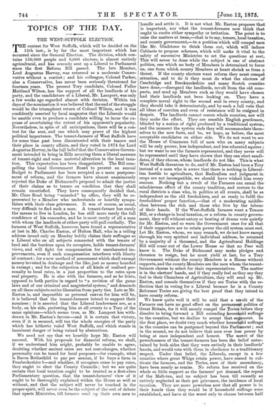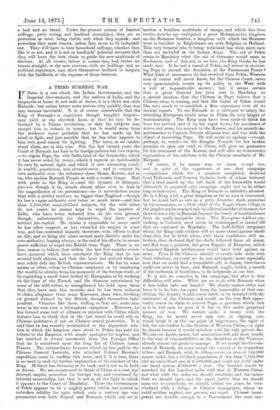TOPICS OF THE DAY.
THE WEST-SUFFOLK ELECTION.
THE contest for West Suffolk, which will be decided on the 15th inst., is by far the most important which has occurred since the General Election. The division, which con- tains 150,000 people and 6,000 electors, is almost entirely agricultural, and has scarcely sent up a Liberal to Parliament since the first Reform Bill passed. The late Member, Lord Augustus Hervey, was returned as a moderate Conser- vative without a contest ; and his colleague, Colonel Parker, also a Conservative, has never been seriously threatened for fourteen years. The present Tory candidate, Colonel Fuller Maitland Wilson, has the support of all the landlords of his party, and the candidature of a Liberal, Mr. Lamport, was only a few weeks ago regarded almost with derision. Within ten days of the nomination it was believed that the end of the struggle would be the triumphant return of Colonel Wilson, and it was confidently asserted by local magnates that the Liberals would be unable even to produce a candidate willing to incur the ex- pense of ascertaining the extent of his opponent's popularity. Nevertheless, in spite of all anticipations, there will be a con- test for the seat, and one which may prove of the highest political importance. The tenant-farmers of West Suffolk have for some time past been discontented with their tenure and their place in county affairs, and they voted in 1874 for Lord Augustus Hervey, in the full belief that the Conservative Govern- ment intended to bring in Bills securing them a liberal measure of tenant-right and some material alteration in the local taxa- tion. This expectation has been disappointed. The Bill com- pelling the local Government Board to present an annual Budget to Parliament has been accepted as a mere postpone- ment of reform, and the farmers have almost unanimously rejected the Duke of Richmond's prciposal to admit the justice of their claims as to tenure on condition that they shall remain unsatisfied. They have consequently decided that, Mr. Clare Read being "muzzled" by office, they will be re- presented by a Member who understands or heartily sympa- thises with their class grievances. It was of course, as usual, very difficult to find such a man. A tenant-farmer has rarely the means to live in London, he has still more rarely the full confidence of his comrades, and he is most rarely of all a man with whom the landlords of either party will pull cordially. The farmers of West Suffolk, however, have found a representative at last in Mr. Charles Easton, of Holton Hall, who in a telling address issued only on Monday boldly claims their suffrages as a Liberal who on all subjects connected with the tenure of land and the burdens upon its occupiers, holds tenant-farmers' views, and will fight for compensation for unexhausted im- provements, even if such compensation interferes with liberty of contract ; for a new method of assessment which shall exempt money invested in drainage and the like, just as money hoarded is exempt ; and for the subjection of all kinds of realised per- sonalty to local rates, in a just proportion to the rates upon real property. He is also with the farmers, and as he hints, opposed to both parties in regard to "a revision of the game laws and of our criminal and magisterial system," and demands on all these subjects entire liberation from party ties. Late as Mr. Easton is, and impossible as personal canvas for him will be, it is believed that the tenant-farmers intend to support their nominee ; it is asserted that the Liberal landowners are, as a body, on his side, preferring him at all events to a Tory of the same opinions—which seems true, as Mr. Lamport has with- drawn in Mr. Easton's favour—and it is certain that victory, even if it is secured, will tax the whole energies of the party which has hitherto ruled West Suffolk, and which stands in imminent danger of being ruined by abstentions.
We need not say that we heartily hope Mr. Easton will succeed. With his proposals for financial reform, we shall, if we understand him aright, probably be unable to agree, doubting whether ancient rates are not rent-charges, whether personalty can be taxed for local purposes—for example, what is Baron Rothschild to pay per annum, if he buys a farm in Pembrokeshire ?—and whether, if occupiers cease to pay rates, they ought to elect the County Councils ; but we are quite certain that local taxation ought to be treated as a first-class Parliamentary question, that the tenant-farmers' view of it ought to be thoroughly explained within the House as well as without, and that the subject will never be touched in the proper spirit, will never even be the subject of the sort of debate that upsets Ministries, till farmers send up their own men to
handle and settle it. It is not what Mr. Easton proposes that is important, nor what the tenant-farmers now think that ought to excite either sympathy or irritation. The point is to raise the matters at issue,—that is to say, tenure, local taxation, and county government,—to a position which will compel men like Mr. Gladstone to think them out, which will induce Cabinets to propose schemes, which will make it vital to the safety of successive Ministries to set the questions at rest.. This will never be done while the subject is one of abstract politics, one which no body of Members is determined to force on, one from which county Members at heart shrink as from a
threat. If the county electors want reform they must compel attention, and to do it they must do what the electors of Cambridge and Brecknockshire and many Scotch countiee have done,—disregard the landlords, revolt from the old com- pacts, and send up Members such as they would have chosen had their landlords not been looking on. They have a complete moral right to the second seat in every county, and they should take it determinately, and by such a full vote that all ideas of coercion and even of resistance will be resigned in despair. The landlords cannot coerce whole counties, nor will they make the effort. They are sensible English gentlemen, blinded by a notion of right produced by a traditional system,. and the moment the system ends they will accommodate them- selves to the new facts, and be, we hope as before, the most acceptable candidates on either side. We do not want to see the House of Commons full of men who on many subjects will be only poorer, less independent, and less educated squires ; but we want to see the farmers represented, and they never will be represented until they have shown that they can elect candi- dates, if they choose, whom landlords do not like. This is what West Suffolk threatens to do, and if Mr. Easton had been a Tory. instead of a man who is aware that there is nothing in Liberal- ism hostile to agriculture, that Radicalism and judgment in crops are not incompatible, we should have wished him every success. Nothing but a revolt of the Farmers can annul the- mischievous effect of the county tradition and restore to the- rural districts a class who, in politics at all events, shall be as independent as the old freeholders, and as ready to fulfil the' freeholders' proper function,—that of a moderating middle- class between the rich and those who live by the labour- of their hands. If the West-Suffolk farmers want a Tenure- Bill, or a change in local taxation, or a reform in county govern- ment, they will without outcry or beating of drums vote quietly for Mr. Easton, and so warn the Government once for all that if their supporters are to retain power the old system must end. Let Mr. Easton, whom, we may remark, we do not know except through his very spirited and individual address, be returned by a majority of a thousand, and the Agricultural Holdings Bill will come out of the Lower House so that no Peer will. know it. The Duke of Richmond may make pledges and. threaten to resign, but he must yield at last, for a Tory Government without the county Members is a House without supports, and the county Members are the men whom the tenant- farmers choose to select for their representatives. The matter is in the electors' hands, and if they really feel as they say they feel in their Chambers of Agriculture, they will send up Mr.. Easton, and console themselves if they are Tories with the re- flection that in voting for a Liberal because he is a County Reformer Tories are giving the best proof that they intend to have county reform.
We know quite well it will be said that a revolt of the Farmers can have no good effect on the permanent politics of Great Britain, for it will merely compel the Tories before they dissolve to bring forward a Bill extending household suffrage to the counties, but we decline to accept that argument. lin the first place, we doubt very much whether household suffrage in the counties can be postponed beyond this Parliament ; and in the second, we do not believe that men ever lose power by being at once independent and honest. The secret of the powerlessness of the tenant-farmers has been the belief enter- tained by both sides that they were entirely in their landlords' hands, and would vote with them in obedience to a traditionary respect. Under that belief, the Liberals, except in a few- counties where great Whigs retain power, have ceased to cul- tivate the farmers, and the Tories, sure of their ascendancy, have been nearly as remiss. No reform has received on the whole so little support as the farmers' pet demand, the repeal of the Malt-tax, and no subject has been till recently so entirely neglected as their pet grievance, the incidence of local taxation. They are more powerless now that all power is in their hands than they would be if household suffrage were established, and have at the worst only to choose between half
a loaf and no bread. Under the present system of limited suffrage, party voting, and landlord ascendancy, they are as powerless as mice, being visible only when they squeak ; and powerless they must remain, unless they chose to be independ- ent. They will have to bear household suffrage, whether they like it or not, and it is not as landlords' political servants that they will have the best claim to guide the new multitude of electors. At all events, before it comes they had better set tenure straight, or the new electors, with no holdings and no political experience, may show themselves inclined to bargain with the Landlords at the expense of those between.



































 Previous page
Previous page